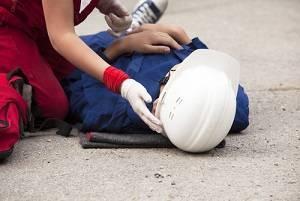
 The Fourth of July is one of the highlights of summer for many individuals. It is a time to get together with friends and family and celebrate our great nation’s independence. The summer festivities usually include fireworks, food, and for many gatherings, alcohol. Unfortunately, the combination of drinking and travel leads to thousands of tragedies every year.
The Fourth of July is one of the highlights of summer for many individuals. It is a time to get together with friends and family and celebrate our great nation’s independence. The summer festivities usually include fireworks, food, and for many gatherings, alcohol. Unfortunately, the combination of drinking and travel leads to thousands of tragedies every year.
Sobering Statistics
The Fourth of July is the second deadliest day of the entire year as a result of alcohol-related car accidents—trailing only New Years Eve. Roughly 40 percent of all traffic fatalities on Independence Day involve at least one driver with a blood-alcohol content (BAC) above the legal limit of 0.08 percent. That percentage is even higher among younger drivers.
The dangers extend beyond the holidays, however. Traffic fatalities increased by 6% from 2015 to 2016, making 2016 the deadliest year for drivers in almost a decade. Additionally, an estimated 4.6 million people were seriously injured because of traffic accidents last year.
 Workers’ compensation reform has been a hot topic over the past few decades, with many states deciding that lowering employer costs for insurance coverage will help encourage new job growth within state lines. The logic of many policymakers maintains that by cutting costs for employers and increasing their margins, the profits will trickle down to the employees in terms of job creation and higher wages.
Workers’ compensation reform has been a hot topic over the past few decades, with many states deciding that lowering employer costs for insurance coverage will help encourage new job growth within state lines. The logic of many policymakers maintains that by cutting costs for employers and increasing their margins, the profits will trickle down to the employees in terms of job creation and higher wages.
However, the truth of the matter is that workers’ compensation reform only hurts employees and the local economy. It makes it more difficult for injured employees to receive the benefits they need and reduces the benefits available to each worker. Injured employees may be in danger of being evicted from their homes and being denied the medical coverage they deserve because of some these reforms, which are currently being pushed by Illinois lawmakers. If you have been denied workers’ compensation benefits, contact an experienced workers’ compensation attorney at once for professional assistance with your case.
 Information from the Centers for Disease Control and Prevention (CDC) indicate that some 1.7 million people experience a traumatic brain injury (TBI) in the United States each year. Most are treated and then released (about 1.365 million), but approximately 275,000 are hospitalized and another 52,000 suffer fatality. Early detection can sometimes mean the difference between mild and more severe injuries. Learn how to tell if you or someone you love has experienced a TBI, and what you can do after the fact to increase the chances of a full recovery.
Information from the Centers for Disease Control and Prevention (CDC) indicate that some 1.7 million people experience a traumatic brain injury (TBI) in the United States each year. Most are treated and then released (about 1.365 million), but approximately 275,000 are hospitalized and another 52,000 suffer fatality. Early detection can sometimes mean the difference between mild and more severe injuries. Learn how to tell if you or someone you love has experienced a TBI, and what you can do after the fact to increase the chances of a full recovery.
Causes of Traumatic Brain Injury
One of the first ways to detect TBI is to understand how it happens. Most occur either after a strike or blow to the head, which might be experienced during a fall (the leading cause of brain injury), car crash (the third leading cause of TBI), or assault. However, contact with an object or a hit to the head is not required; some traumatic brain injuries occur because of jarring motions that force the brain to move quickly inside the skull. In fact, this is the same injury that happens to infants who suffer from shaken baby syndrome. As such, even those who have not hit their head in an accident but experience the common signs should see a doctor.
 When a person is attacked or injured by a dog, the results can be very serious. Some of the most terrifying attacks occur when a small child is mauled. Children tend to be attacked more often than adults; in fact, 70 percent of fatal dog attacks involve children. Tragically, the likelihood that the child will die as a result of the attack is also high.
When a person is attacked or injured by a dog, the results can be very serious. Some of the most terrifying attacks occur when a small child is mauled. Children tend to be attacked more often than adults; in fact, 70 percent of fatal dog attacks involve children. Tragically, the likelihood that the child will die as a result of the attack is also high.
Dog bites can end up being extremely severe and may cause a myriad of injuries, many of them potentially fatal. If your loved one has died as the result of a dog attack, speak with a dog bite attorney right away to help you in your quest to recover compensation for the death of your loved one.
Seeking Compensation
A ferocious dog attack can do more than injure; it can lead to death. Dog bite victims often become paralyzed with fear, leaving them even more susceptible to serious injuries. The depth of the wounds and the blood loss can be traumatic, and depending on where on the body, an attack can leave the victim without a chance for survival. In the event your loved one succumbs to their injuries, you, as the surviving family, may pursue compensation. Damages can be sought for grief, sorrow and mental suffering in addition to monetary losses for medical care and other expenses related to the injury and death.
 Pedestrians, in most situations, generally cross the street at specified and controlled locations, expecting that cars will obey the relevant traffic signals. When a driver fails to meet that expectation, the pedestrian is unable to move out of the way quickly enough to avoid being hit. Unprotected and vulnerable, pedestrians then become at risk for death or serious injury. Both are on the rise in Illinois, and throughout the United States. If one has happened to you or someone you love, the following can help you understand your rights, including your right to pursue fair compensation.
Pedestrians, in most situations, generally cross the street at specified and controlled locations, expecting that cars will obey the relevant traffic signals. When a driver fails to meet that expectation, the pedestrian is unable to move out of the way quickly enough to avoid being hit. Unprotected and vulnerable, pedestrians then become at risk for death or serious injury. Both are on the rise in Illinois, and throughout the United States. If one has happened to you or someone you love, the following can help you understand your rights, including your right to pursue fair compensation.
Understanding the Risk
The rise in pedestrian accident deaths is not a particularly new trend, but it is one that continues to trouble health and safety professionals. This past year, the national increase reached its highest number since 2005. Federal officials estimated an increase of nine percent during just the first six months of the year. In Illinois specifically, the death toll rose from 127 in 2015 to 150 deaths in 2016.
 Injuries happen everywhere on a daily basis. They occur at home, on the roadway, at school, and even at your workplace. No matter where they occur, there is often insurance coverage available to cover such injuries. By law in Illinois, insurance is required nearly everywhere, including by your employer. This benefit is known as workers’ compensation insurance, and it covers a wide variety of situations should you find yourself a victim of a workplace injury.
Injuries happen everywhere on a daily basis. They occur at home, on the roadway, at school, and even at your workplace. No matter where they occur, there is often insurance coverage available to cover such injuries. By law in Illinois, insurance is required nearly everywhere, including by your employer. This benefit is known as workers’ compensation insurance, and it covers a wide variety of situations should you find yourself a victim of a workplace injury.
What Is Workers Compensation Insurance?
Worker’s compensation insurance is a type of coverage that employers generally carry for the benefit of their employees. Not every state currently requires employers to have this insurance, which could potentially open the employer to personal liability claims. In Illinois, an employer must carry workers’ compensation in every work situation, regardless of considerations such as:
 If you were to ask a group of people what time of the year has the most car accidents, the majority of the group would probably say during the winter months—especially in climates such as Illinois. Roads covered with snow, sleet, and ice, along with poor visibility, certainly contributes to many accidents, but statistics show that it is actually the summer months when motor vehicle accidents spike. According to the Insurance Institute for Highway Safety (IIHS), the month of May marks the beginning of the dangerous “summer” driving season
If you were to ask a group of people what time of the year has the most car accidents, the majority of the group would probably say during the winter months—especially in climates such as Illinois. Roads covered with snow, sleet, and ice, along with poor visibility, certainly contributes to many accidents, but statistics show that it is actually the summer months when motor vehicle accidents spike. According to the Insurance Institute for Highway Safety (IIHS), the month of May marks the beginning of the dangerous “summer” driving season
In 2015, the latest year for which national statistics are available, there were more than 35,000 people killed in vehicle accidents. Car crashes in the month of August claimed the most victims—over 3,300. In fact, from May through October, more than 3,000 crash-related fatalities occurred in each month.
 Spring has arrived in Northern Illinois, which means that the individuals and families throughout the region will be spending more time outside enjoying the warmer weather. For many, springtime also marks the beginning of another year of motorcycle riding. With that in mind, rider safety groups and state officials throughout Illinois are urging riders to protect themselves and to keep the road safer for those around them. It is the responsibility of every rider, driver, and pedestrian to do what they can to prevent motorcycle accidents and the injuries that often result.
Spring has arrived in Northern Illinois, which means that the individuals and families throughout the region will be spending more time outside enjoying the warmer weather. For many, springtime also marks the beginning of another year of motorcycle riding. With that in mind, rider safety groups and state officials throughout Illinois are urging riders to protect themselves and to keep the road safer for those around them. It is the responsibility of every rider, driver, and pedestrian to do what they can to prevent motorcycle accidents and the injuries that often result.
Making a Difference
Every year hundreds of deaths are caused by motorcycle accidents in the state of Illinois. In fact, motorcycle-related deaths comprise more than 15 percent of all vehicle fatalities in the state. Tragically, many of these accidents can be prevented by following a few simple safety procedures:
 Coal mining is an inherently dangerous job. However, recent safety measures of the last few decades have made the occupation leaps and bounds more safe and sustainable for Illinois coal miners. In 1972, for example, 114 miners died in a single disaster in Saunders, West Virginia, according to the Centers for Disease Control and Prevention (CDC). On a longer-term scale, the Mines Safety and Health Administration (MSHA) began tracking mining fatalities in 1978. The peak year for fatalities was 1979, a tragic year with well over 250 deaths.
Coal mining is an inherently dangerous job. However, recent safety measures of the last few decades have made the occupation leaps and bounds more safe and sustainable for Illinois coal miners. In 1972, for example, 114 miners died in a single disaster in Saunders, West Virginia, according to the Centers for Disease Control and Prevention (CDC). On a longer-term scale, the Mines Safety and Health Administration (MSHA) began tracking mining fatalities in 1978. The peak year for fatalities was 1979, a tragic year with well over 250 deaths.
Fatalities declined during the 1980s, 1990s, and 2000s, with just 45 fatalities in 2014. The improvements have come from strong enforcement of safety rules and regulations, better equipment and increased training, education, and technical support. However, there is still a long way to go before coal mining is considered safe and the number of fatal injuries reaches zero. If you have been injured working in the coal industry, contact an attorney for assistance in recovering workers’ compensation benefits
 Sports and athleticism are encouraged within our lives and are essential parts of our education system. Our children learn a lot about life when competing in sports: how to work as part of a team, how to overcome adversity, how to accept both the wins and the losses. There is always, however, an inherent risk of injury when participating in sports. What happens if the injury is not inherent to the sport? Who is at fault?
Sports and athleticism are encouraged within our lives and are essential parts of our education system. Our children learn a lot about life when competing in sports: how to work as part of a team, how to overcome adversity, how to accept both the wins and the losses. There is always, however, an inherent risk of injury when participating in sports. What happens if the injury is not inherent to the sport? Who is at fault?
The Assumption of Risk Doctrine
The assumption of risk doctrine in regard to participation in athletics dictates that by participating in a sport, one understands that there is a possibility of injury. A baseball player while at bat may not be surprised if he gets hit with a pitch because being hit with the ball is an acknowledged possibility and therefore the injury was foreseeable. The doctrine, as developed by case law in Illinois, determines the point where an athlete assumed the risk of injury inherent in the sport.